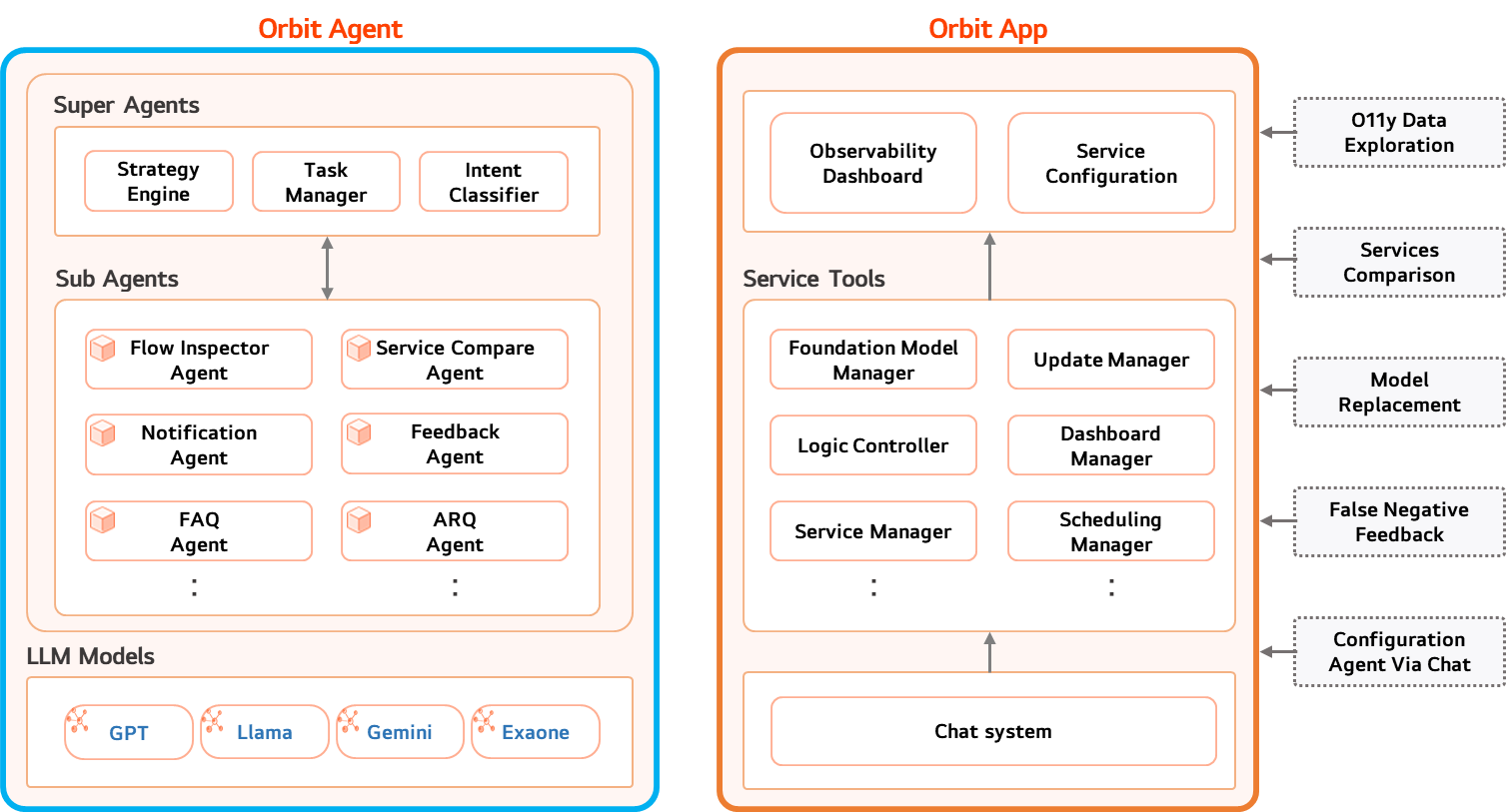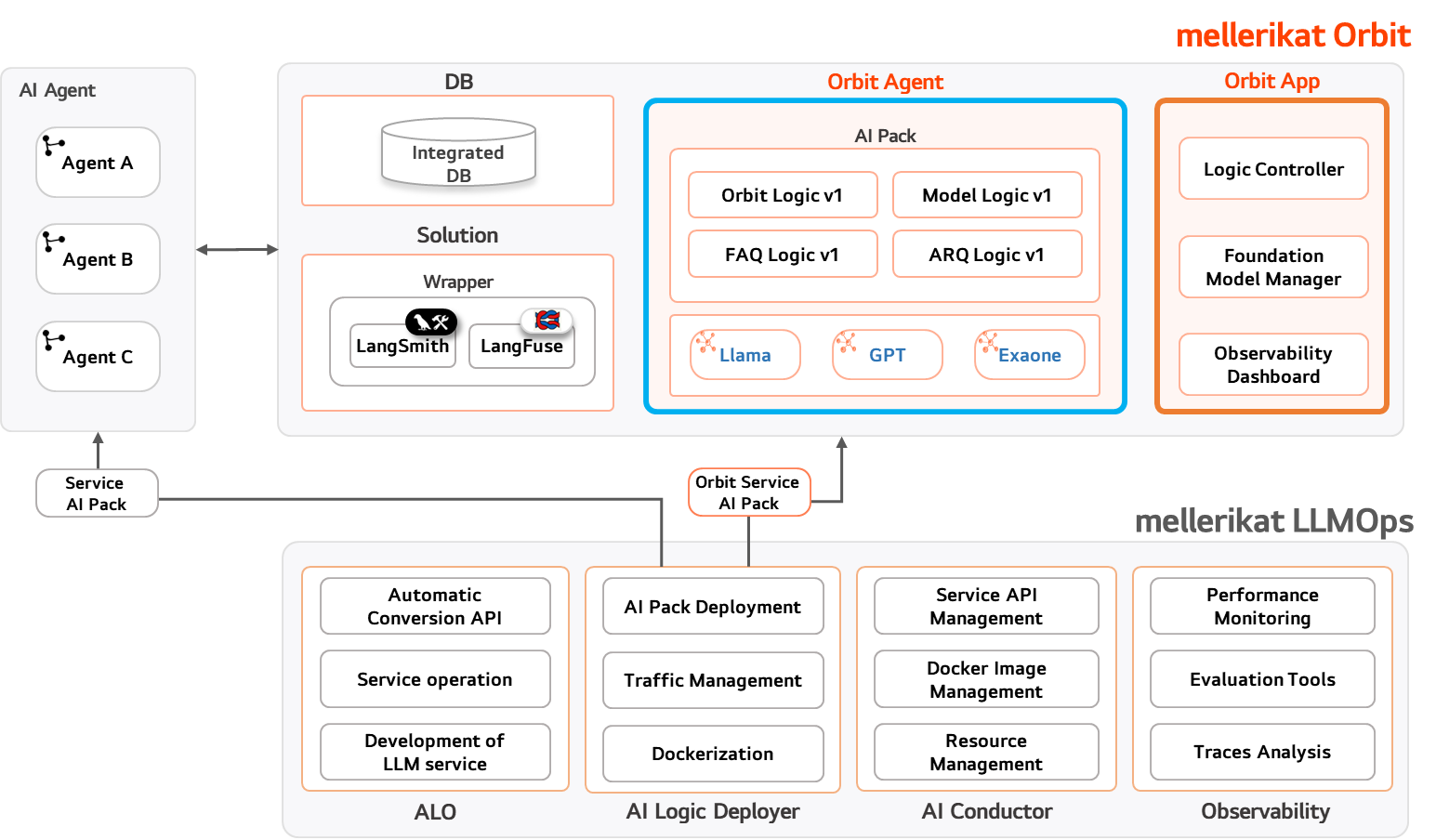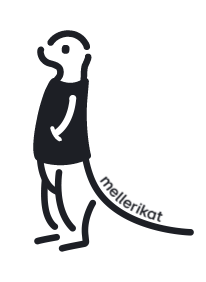Orbit
AI service operations have long relied on Observability, or the ability to observe, as a key element. It has been an essential tool for understanding how systems function and identifying where problems occur. However, simple observation is no longer enough. If the process stops at merely detecting issues, operators must manually analyze and respond, which requires significant time and effort. Today, companies strongly desire a platform that goes beyond basic monitoring—one that can detect problems autonomously, propose improvements, and even evolve on its own.
Orbit was created to meet this very demand of our time. At its core, Orbit leverages data gained through observation to implement intelligence that actively improves and optimizes services. The philosophy of Orbit is best captured by the phrase Beyond Observability, Into Intelligence. In other words, enabling service operations that not only observe but also intelligently evolve on their own—this is the core value and philosophy that Orbit pursues.
Learn about o11y through the podcast below.
Core Values of Orbit
Beyond simple monitoring, into intelligent services
Orbit is an intelligent platform designed to go beyond simple monitoring, enabling services to evolve on their own. Prompts, responses, user feedback, and performance metrics generated during operation are not just recorded but utilized as key resources for continuous improvement. Based on this, Orbit manages AI agents, analyzes user activity patterns to diagnose issues, and automatically incorporates improvements. As a result, services become more sophisticated and stable over time, allowing operators to achieve both efficiency and reliability.
Core Values
Service Quality Improvement
Continuous enhancement of Intelligence services such as FAQ and linked questions based on the latest Observability data
Operational Efficiency
Easy Orbit integration through legacy DB mapping and natural language queries for o11y data retrieval
Cost Effectiveness
Reducing operational costs by selecting and switching to the optimal model based on multi-foundation model scenarios
mellerikat Orbit
Mellerikat ORBIT Components that Evolve Services Smarter
ORBIT consists of the ORBIT Agent and ORBIT Application. Each component can be independently installed and operated for its specific purpose, while also working organically together to enable intelligent operations across the entire service. Through this structure, ORBIT functions as a platform that offers both flexibility and scalability.

Orbit Agent : Intelligence Controls
데이터를 기반으로 서비스를 지능적으로 제어하는 핵심 엔진
The core of Orbit Agent lies in two aspects.
First, it builds an Intelligence Layer by leveraging vast amounts of data. With processes such as FAQ generation, linked question recommendations, and prompt optimization all driven by data, Orbit Agent evolves beyond a simple collection of agents into a meta-intelligence service. In other words, Orbit Agent transforms data from mere records into intelligent assets that enhance service quality.
Second, it manages services to operate exactly as the operator intends. For example, if you want to enable the FAQ function across all agents, Orbit Agent can execute it at once. Or, if you want to switch from a GPT API-based setup to a lightweight model like sLM, Orbit Agent manages the transition for the entire system.
Ultimately, Orbit Agent is not just a set of features but a management layer that creates the Intelligence Layer from data and ensures services run as operators desire.
Automatically Generated FAQ Service Based on User Logs
The FAQ service is a system that automatically creates and updates FAQs in real time, reflecting the latest issues and user trends. Traditional static FAQs had long update cycles, making it difficult to address newly emerging issues or rapidly changing user interests. In addition, many users often did not even know “what or how to ask,” leading them to repeatedly inquire about the same content or even abandon the service. Developers and operators had to manually collect data and detect changes, which required significant time and effort, making timely FAQ management challenging.
The Auto FAQ service was designed to solve these problems by addressing delays in providing answers to frequently asked questions or new issues. By analyzing collected logs, user feedback, and response records, the service automatically identifies recurring questions and keeps the corresponding answers up to date.
자동 FAQ 서비스
Follow-up Question Suggestion Service That Proposes Next Questions and Maintains Conversation Flow
Typical LLMs provide only one answer per question, which forces users to design follow-up questions themselves. If they cannot find an appropriate direction, the conversation may break down or become repetitive. Orbit's linked/follow-up question suggestion service analyzes user logs and conversational context to understand relationships between questions and, in real time, proposes linked and supporting questions. This strengthens both the flow of dialogue and the depth of information exploration. As a result, LLM-based conversational systems evolve from simple one-off response engines into continuous, goal-oriented conversational environments.
Follow-up Question Suggestion Service
Orbit Application : Operational Hub
An Operational Hub Supporting Multi-Foundation Model Switching and Service Logic Optimization
Orbit Application is the operational hub directly accessible to users.
At the most basic level, it begins with the intuitive exploration of Observability data. But it goes further, offering functionality for multi-foundation model switching. For example, operators can easily transition from a GPT API to an sLM model, or select the most suitable model for specific scenarios directly through the Application. In addition, operators can directly modify or restructure the prompt logic of services running in the Intelligence Layer. In other words, it supports management not only of monitoring but also of actual service logic.
Another key feature of Orbit Application is its pulling-based model download capability. For instance, when we release a new recommendation model with guidance such as, “This model is lighter and delivers better performance,” companies can directly download it via the Application and run it in their on-premise environment. Since it uses a pull-based approach rather than push, customers have the advantage of choosing and controlling the timing themselves. Ultimately, Orbit Application is more than just a UI tool—it is a practical operational hub that covers model switching, prompt logic restructuring, and cost optimization.
Orbit Core Values
Advancing Service Quality
Many companies face the challenge that once an agent is created, its quality does not significantly improve over time. Feedback accumulates, but it does not automatically lead to performance improvements. Orbit is different. It leverages the Observability data generated during agent execution directly as a resource for enhancing quality. This data is fed into Intelligence Layer services such as FAQ generation, linked question recommendations, and scenario reinforcement, enabling self-upgrades. In other words, the more users engage with agents, the more data accumulates, which in turn drives continuous service quality improvement in a virtuous cycle. Orbit does not simply operate static agents—it provides an ever-evolving agent ecosystem.
Operational Efficiency and Scalability
It doesn't matter if your company's Observability DB was not originally built with our solution. Simply scan and map the tables, and Orbit Agent will immediately connect, making services like FAQ generation and linked question recommendations instantly available. If your DB is already set up in environments like LangSmith or LangFuse, there is no need to build a new system—just add Orbit on top, and you can enjoy its value within your existing environment. Moreover, because Orbit runs on the Mellerikat LLMOps platform, it also supports automatic AI service deployment, seamless upgrades, and stable management. Partners can achieve both rapid adoption and secure scaling at the same time.
Cost Reduction
Today, many AI services are based on the GPT API, but not every service requires a large-scale model. For example, simple FAQs or linked questions can yield meaningful results using just zero-shot prompts and lightweight language models (sLMs). Since Orbit supports Multi-Foundation Models, it allows easy selection and switching to the optimal model tailored to the service's characteristics. When a new model is developed, companies can directly download it through the Orbit Application and run it in their on-premise environments. Because this is a pull-based, not push-based approach, companies can flexibly decide the timing and method of adoption to align with their own infrastructure and security policies.
This structure not only reduces costs in the short term but also significantly lowers the Total Cost of Ownership (TCO) in the long run, enabling enterprises to operate AI services in a more economical and sustainable manner. This is the greatest value that Orbit provides.
Service Architecture
A Self-Learning Cycle of Evolving AI
The structure of Orbit is simple yet powerful. At its core are two components: the Orbit Agent and the Orbit Application. It doesn't matter whether it's a legacy DB or the latest DB. By scanning and mapping the tables, the Orbit Agent can immediately connect and operate. The important point here is that it does not need to be our framework. In other words, Orbit can be placed directly on top of a partner's existing DB environment. Then comes the Orbit Application. The Application is the hub that operators can directly manage. From controlling the behavior of Agents to simple Observability data queries, Foundation model switching, and even restructuring the Orbit Agent's prompt logic—everything can be managed through the Application. When Orbit is installed, the Orbit Agent and Application are set up together by default, while on the backend, the latest Foundation models and logic updates are delivered as services through Mellerikat. DB → Orbit Agent → Orbit Application → Upgraded Service This simple flow is the very essence of Orbit.
Orbit Architecture

